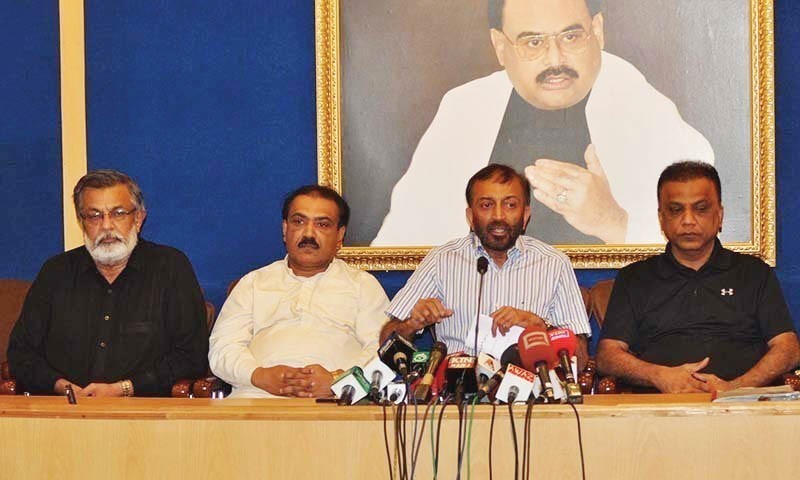
The MQM seems to be feeling the heat of the current operation severely and is closing up its ranks in response

Anger and confusion reign in the hearts and minds of Muttahida Qaumi Movement (MQM) activists as the federal government-led Karachi Operation continues unabated.
Political activities of the party remain suspended in the city as units and sectors offices are closed and senior activists have been strictly warned from staying out of "anything political," while the ones with "shady records" went underground.
Internally, however, the party, despite plain restrictions, is trying to keep the activists motivated. For instance, Altaf Hussain’s interview with Geo TV’s anchor Salim Safi, which was not allowed to be run, was shown to the members of its student wing APMSO in Karachi University on Tuesday, Aug 18.
While a few months back, a movie based on the life of a revolutionary freedom fighter from South Asia was shown to newly-recruited student activists at a college auditorium in North Nazimabad, "as part of a lesson on the importance of standing for one’s right," says one student.
One observer says that the MQM is going back to its old ethnic rhetoric and to an extent, eschewed politics as part of the strategy, to inject a refreshing revolutionary zeal among "party workers who did not witness the 1992 Operation."
It became more evident when the party, after tendering resignations from the parliament, claimed that it will keep its struggle to make Karachi an independent province and indulge in social welfare activities only.
"That is MQM’s core political manifesto since its inception," says a senior activist. "The idea was applauded by many old-school members, who believe politics by definition is hypocrisy. And serving the people of Karachi is what the party was meant to do from day one."
Although there are reports that Prime Minister Nawaz Sharif has accepted certain reservations regarding the operation when he met the MQM’s delegation in Islamabad, local activists feel that the operation will continue with the same ferocity, since the "remote control lies in someone else’s hand," says one activist.
Meanwhile, a close look into the MQM’s regular reshuffling of the powerful Co-ordination Committee shows the party is closing up its ranks and bracing for tough times ahead.
Insiders say that veteran activists who stood with the party during the tough years of early 1990s are being called back and given responsibilities. "They are individuals whose loyalty is not tainted by power or wealth," says another activist.
Observers say that since the Pakistan Tehreek-e-Insaf’s unprecedented gains in the last general elections, Altaf Hussain is incensed at his workers and leaders in Karachi for not doing enough for the people. And with the passage of time, the London leadership has tried new faces but is unable to build a Raabita Committee that can be allowed to run the affairs with relative independence.
Going by their claims, some 160 MQM leaders and activists are still in detention of the law enforcement agencies and 45 have been extra-judicially killed since the start of the operation in September 2013.
Compared to the 1992 Operation against the MQM, in which, the party claims, over 3,000 activists were extra-judicially killed, the current raids and detention are insignificant.
But the MQM seems to feel the heat of the current operation a lot more severely. Because it believes that the power-that-be is after something a lot more crucial.
For the regular MQM activists, the Karachi Operation is not against the criminal elements in the city but the public mandate of the party earned over several painstaking years.
Party activists, who are picked up by the Rangers, are mostly released after a few weeks of detention. For instance, the 12 MQM activists and sympathisers, arrested on their way to Hyderabad from Karachi on July 29, have been, reportedly, released.
Some are surely "kept invisible for months" and in extreme cases, extra-judicially killed, the party claims. But senior party activists say that back in 1992, the party was very much a student organisation in transition.
"Back in 1992, we were in the making, and yes we may have made mistakes," says an activist, "but this operation is aimed at the political credibility the party earned over more than a decade by serving the people, which is more painful".
What is bothering the party more than anything else is the insistent media trial which often comes in the shape of press releases issued by the law enforcement agencies against the alleged crimes of its workers.
Party workers claim that an unprecedented turnout was witnessed on the night of August 13 at Nine Zero, when the party organised the Independence Day celebrations, but not a single media outlet was there to cover it. "Thousands gathered at Nine Zero and we stayed up till Fajr. But nobody got to know about it. This is what hurts. Especially when we are being called the traitors of Pakistan," says an activist.